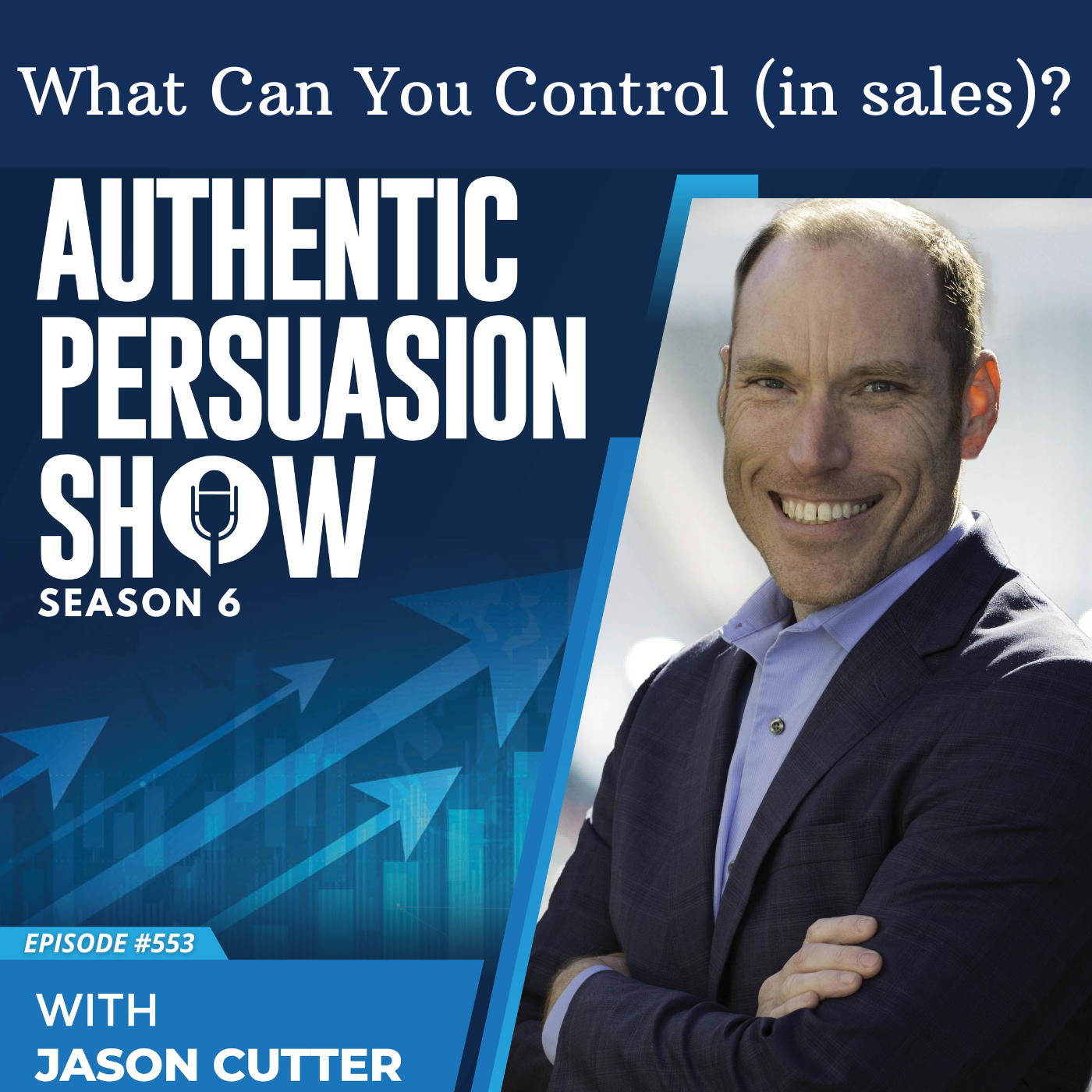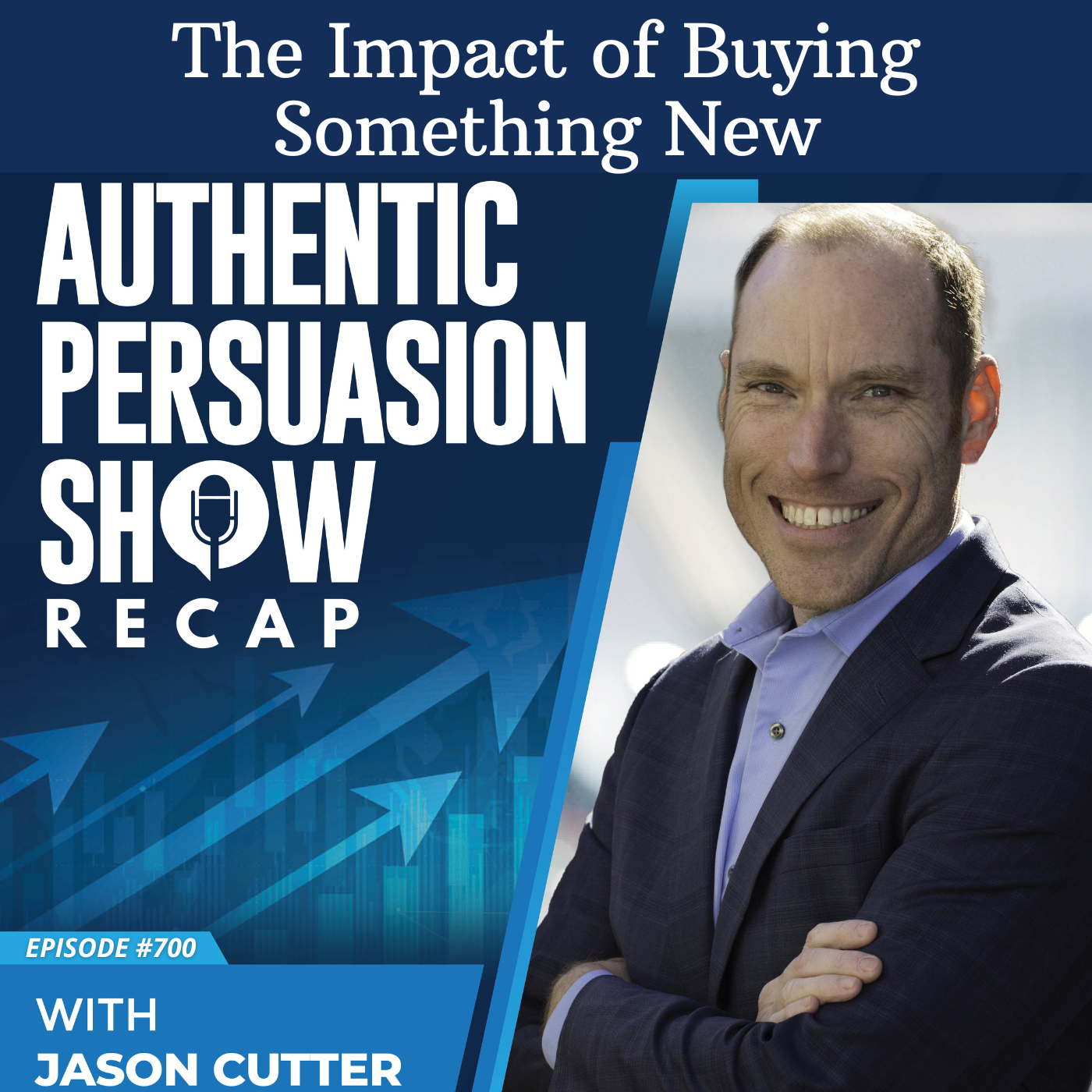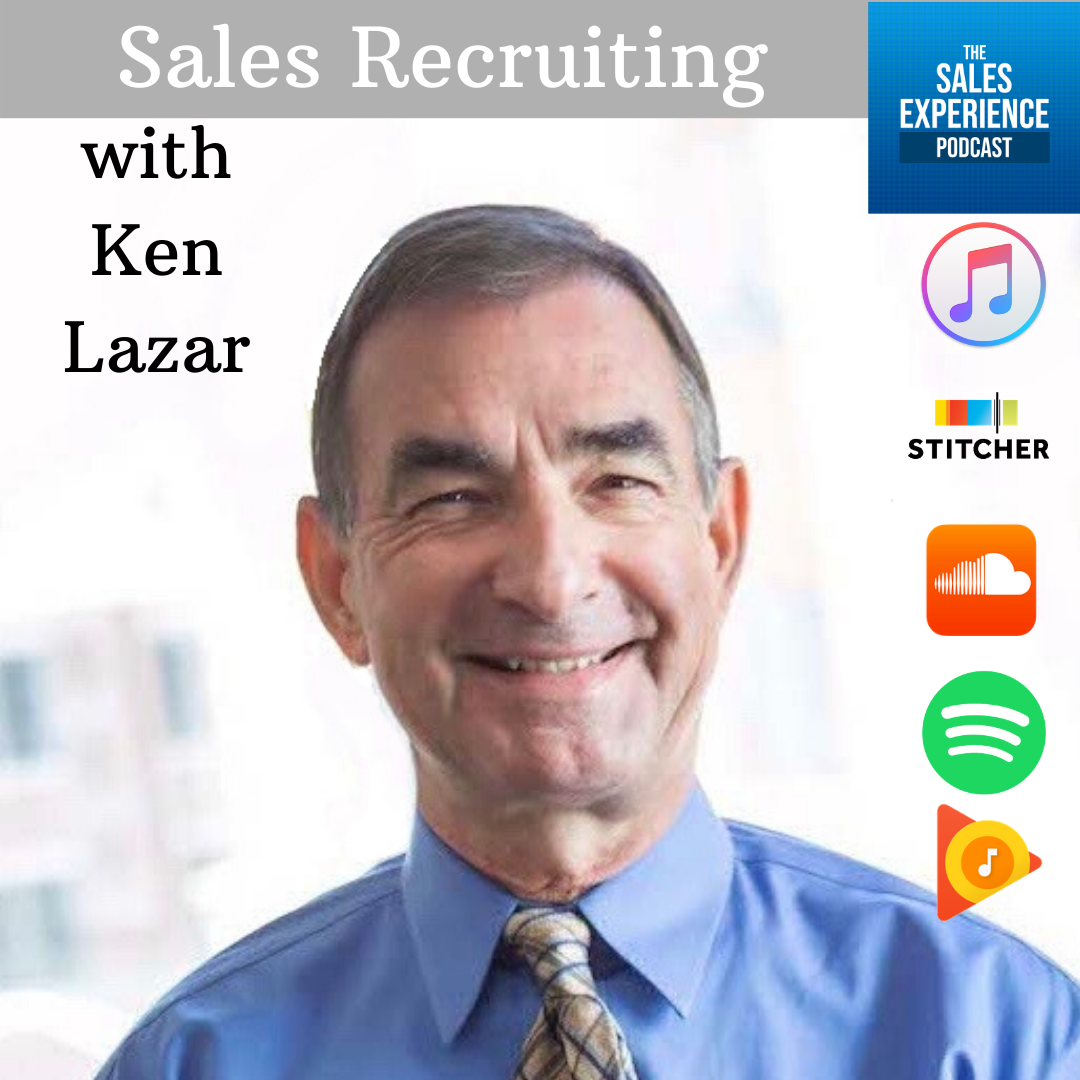Episode Transcript
Jason [00:00:00]:
This is the authentic persuasion show. What's going on? Welcome to the authentic Persuasion show. This is episode 610. My name is Jason Cutter. You're here because something brought you to this episode. Maybe you're a longtime listener. Maybe you're a longtime subscriber.
Jason [00:00:19]:
Maybe you've listened to all 609 of the previous episodes, way back to when this was called the sales experience pod gas. Maybe you followed me on my journey when I broke out and did the scalable call center sales podcast. Also did a couple of seasons with my friend Oliver Kat on call center confidence with Cutter and cat. Either way, you're here. Maybe this is your first episode, first time you found the podcast, you're in sales. Maybe you're in sales leadership. You're here. Welcome.
Jason [00:00:43]:
Let's get into this. So one of the things that came up recently, and this is in a conversation I actually had with Dr. Riley Dugan from the University of Dayton, which is his episodes, his three parts will start tomorrow. One of the things he said in part three, which sparked me to want to have a conversation about this with you for an episode, is in the third part, which will come out on Thursday. It'll be episode 613. And you can hear him go into more detail when I asked him about what buyers want more of and what do they want less of. One of the big things that came up here is a punchline is that so many in people in sales lack respect for the buyer's time. And this shows up in so many ways.
Jason [00:01:25]:
The first way that it shows up is I'm going to send you an email, right? I'm sending you a prospecting email. I'm going to send you a prospecting LinkedIn. Then I'm going to send you another email. And then another one. Hey, checking in. Hey, want to move this to the top of your inbox? Hey, just want to make sure you got this. There's an amount of follow up that makes sense, right? There's some amount where it's like somebody sees something, it's going to hit them at the right time, and you just don't know where that is. And then there's the, hey, here's this email.
Jason [00:01:51]:
If this is interesting to you, use my link and schedule a time right now. It's like we just met, I just found out you existed and now you want me to book a time like, no, I need more than that. You don't respect my time because you just think I have unlimited time and I get those constantly and they make me furious when I get one of those emails or one of those LinkedIn messages where it's, hey, and this is what I get running a consulting company is, hey, I could get you 15 to 30 new leads a month or a week or a day, whatever their pitch is, right? Hey, I could get you these. And we've helped other companies grow like this. And I can do it. Click on my link so we can have a 30 minutes chat or a 15 minutes chat. It's like, do you think I just sit around with nothing to do but click on links so that I can talk to people who want to sell me something? Like, absolutely not. And to me, in my mind, the audacity that you think I'm going to give you my time so you can sell me is just ridiculous, right? That makes me so furious just to assume that now what works better is here's what I provide as a service.
Jason [00:03:06]:
Would this be a valuable, is it worth talking more? Reply back and let's continue the conversation. Right. Let's ease into this. If you're trying to sell someone in a one call, close or go instantly for the dinner date, and you haven't even had a phone call with somebody yet, right? Like on a dating relationship thing, then it's not going to work, I promise. And you can't numbers game your way through that because it's just not, right. It's not going to work. And I've talked about that before. And the challenge with the numbers game, here's the thing.
Jason [00:03:38]:
Buyers are busy. Everybody's busy. Think about yourself and how busy you are. Part of the challenge is that when you're in your sales role, you're focused on sales tasks. And so you're like, I'm busy everywhere else but here. I'm busy on helping get in conversations with buyers. And so the problem is salespeople think, well, this is my job is to reach out and talk to people. You're forgetting that the buyer's job is whatever the buyer is doing as their job, their job is not to let you sell them.
Jason [00:04:09]:
Right? And so one of the challenges is that people in sales do not have a lot of respect for the buyer's time and what the buyer needs. Again, and this goes into what happens a lot where I see people who are amateur salespeople go into conversations and then asking questions that they should already know the answers, especially if you're in a b to B sales role, where if you're asking somebody like, hey, tell us about your business, tell us about your challenges, tell us about your industry, tell us about the industry challenges. Tell me about your customers and what kind of challenges. You can do the research and find all of that, right? In fact, that's even where tools like AI and chat bots, like Chat GPT, that's where you can actually use that and be like, hey, answer these questions and do the research about this company. And then it will come through depending on what recent data it has, right. And not an endorsement for those tools, but that's what those tools can be used for. Save you time and then ultimately save your buyers time. So you're not wasting their time with your dumb questions that you should already know the answer to.
Jason [00:05:22]:
Now what you can do. And I think this is brilliant and I love this. And this is something that Naylani Gruel brought up in the conversations earlier this year or this season on the podcast. And she was on 576, 77 and 78 and she was actually a non sales student at University of Houston and then went into the sales program and then became a staff member and then graduated and then got a sales role. So she went through the track that way. And one of the big things she said, know having those questions, which is do the research. Hey, I see that companies in your industry have this kind of challenge. Is that what you're seeing? Right? Use the research you did to come up with an intelligent question to further the conversation that shows, a, I did my Homework, I'm not just lazy and then b, I want to know your feedback, is that right or not? And they may say, no, we don't have that challenge, but here's what we have a challenge with, and that is gold.
Jason [00:06:21]:
Like that is what you want. Stop wasting buyers time, right, on pointless questions that you should be able to do the research on. And again, don't assume you know it all, but bring it up in a way, like I said, with the question style that Neilani's professor taught her, use the research to form a statement that then goes into a question that then moves everything forward, right? Please don't be lazy with your discovery questions. Nobody wants it anymore. Nobody has a tolerance for it. And you're only going to piss people off, like literally going to piss people off. Now, I know this is tough. Some people might be triggered and be like, I don't do that or people don't care.
Jason [00:06:59]:
I'm telling you, just be mindful of that. The other part where this is where people waste a lot of time is unnecessary demos and the use of too many words. So many people out there, and I come across them constantly where they use too many words. They say something where they use 100, 500 words in something that could have been done in five words or ten words. Right. It's fun because I'm very focused on being succinct when somebody asks me questions and when I'm talking to somebody, unless I get on a roll and I'm excited about something. But if somebody asks me questions, would you like this? Yes. Some people answer, they'll use too many words in the answer of like, do you want this or would this work for you? And then they just go on monologues.
Jason [00:07:48]:
It's like they don't understand how many words they're using and they don't realize it from the other side. And so what happens is if you use 1000 words and you could have used ten or 50 words, you're wasting people's time. And salespeople, for some reason, a lot of them think that their job is to tell and to sell and to explain and talk a lot. And if I talk a lot, I'm going to look smart and I'm going to look valuable and you're going to want to buy from me and I'm just going to talk talk. Especially the ratio is thrown off. Right? Again, remember this, two ears, one mouth. You should be listening twice as much as you're talking. Easiest way to hit that ratio, say less when you're talking.
Jason [00:08:29]:
I'm not talking about talking less, I'm saying just say less when you talk. Like I said in the previous example about doing the research. Hey, I see that in the research I did before our conversation, that other companies that are in the manufacturing space are having this issue. Is that what you're seeing? Right. I don't need to go into all the monologue about all the research and all the things and like, no, just get to the question and go focus on that and go. And that's one of the biggest things. And he even mentioned it, Riley did in the podcast, know, not wasting buyers time, respecting their time, obviously, and using less words make it about them. Here's what's fascinating as a fun, awesome, valuable byproduct of this, is that the less you say, and I forget who says this, the less you say, the smarter you sound.
Jason [00:09:17]:
And then also the less you say and the more they say that potential buyer, the more they feel heard and then they will actually respect and trust you more because it will feel like you care about them. That's why I say in my trust building formula that I have in my sales process, it's rapport plus empathy which is discovery. But not just discovery for asking questions, it's empathy. Because I care about you, I'm going to use active listening, I'm going to listen to the answers and I want to find out a way to help you get to a better place. When I do that, when I build a rapport authentically, and then we use the empathy step and do that properly, then what happens is you're talking more than me. We've built a relationship, mostly because you're talking and I'm just asking questions and I'm naturally curious. And then what happens is you trust me and that builds into trust and then I have to validate it. Right? I have to tell you why we're so good at what we do and what we sell, but the trust is now there because I've done things different and I've met your needs as a human who wants to be heard and seen and valued, and so that's so important.
Jason [00:10:21]:
So remember that. Focus on what buyers want more of and less of. And in just one way, I'm not even talking about technology and tools and sms and they want more of this and less of this and they want more like. No. What do they want? You to respect their time. Respect their time. Put it in their emails. I'm telling you, I do this all the time.
Jason [00:10:41]:
Hey, I know you're busy. I don't want to be like everyone else. Do you need something like this? Would it be worth talking? Yes or no? That's it, right? Like, just call it like it is. Open the door. Right. If you meet someone and you might want to date them, like, hey, are you single? Ask some questions to just filter and then see if it makes sense to move forward. It's really that easy. So hopefully this helps.
Jason [00:11:03]:
Hopefully this helps you have better conversations with your buyers, waste less of their time, make them feel more valued and valuable, and I promise you will move more deals forward.
![[610] What Buyers Want Less Of From You](https://episodes.castos.com/salesexperiencepodcast/images/1514896/What-Buyers-Want-Less-Of-From-You.png)


